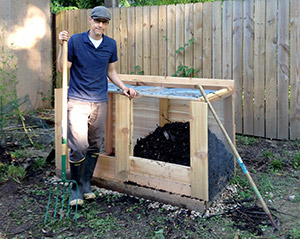 For the Rev. Dr. D. Noah Campbell, D.Min.'13, director of the Memphis Center for Food and Faith, food and spirituality are connected. “I’ve come to understand spirituality as a cipher for all the virtues, emotions, and commitments of authentic, faithful relationships,” he says. “Redemption is a calling to and conditioning for reconciliation into these relationships, including our relationship with creation. And nothing connects us to creation like eating—most of us eat every day!”
For the Rev. Dr. D. Noah Campbell, D.Min.'13, director of the Memphis Center for Food and Faith, food and spirituality are connected. “I’ve come to understand spirituality as a cipher for all the virtues, emotions, and commitments of authentic, faithful relationships,” he says. “Redemption is a calling to and conditioning for reconciliation into these relationships, including our relationship with creation. And nothing connects us to creation like eating—most of us eat every day!”
For Noah, food and its agricultural, economic, ethical, and social dimensions are powerful media for thinking through and acting out our spirituality. “Another way to get at the connection between food and spirituality is to reflect on the mandate to love our neighbor in the light of the way Jesus defines ‘neighbor,’ then to map that understanding on the way we so often eat—with blinders on,” he observes.
Noah’s theological thinking about food and faith germinated during his years in seminary. “In the 1990s friends and I found ourselves confronted by the essays of Wendell Berry. His quixotic and harsh but also beautiful and simple agrarian world fired our social imaginations. We grasped a much more comprehensive vision of the kingdom of God. We also began to discern how food in all its many contexts and facets acts as a helpful currency for depicting and living into these ideals. Food connects the dots. We began dreaming and praying about opening a center for biblical and congregational engagement that would complement a decades-old social discourse around ethical eating. In July 2012 we started MCFF.”
Educational workshops form a major part of MCFF’s operation. Noah describes them: “We start each session by reflecting on a biblical passage from the perspective of food as a gift of creation, or a passage that introduces a theme about ecology. Sometimes we ask participants to share their favorite Bible story about food and how it might act like a vehicle of the kingdom of God. Then we dive deeper into theological themes, such as the relationship between the image of God and our eating practices. When we turn to pragmatics, we address the importance of personal and household economics—how to balance a commitment to good food works while also stewarding our food dollars. Lastly, we introduce some basic tips and resources for church gardening or church-supported agriculture. We hope churches engage not only as a collective of consumers but also as a guild of producers for the local food culture.”
“From the start,” Noah continues, “MCFF wanted to raise awareness about agrarian theology and mindful eating, but we also understood that a community-based food economy needs infrastructure, the markets and logistics of which are called ‘foodways.’ Wanting to help, MCFF developed a business plan for a local foods aggregator. The result is Bring It Food Hub.”
Both the educational workshops and Food Hub grew as Noah pursued D.Min. studies at PTS. “Director Kendall and my project advisors were intentional, even adamant, about keeping my theological questions grounded in the common life and practice of the church. So I explicitly linked our mission at MCFF to my doctoral project, which involved testing an evolving food-faith curriculum for MCFF workshops. The project helped refine our educational programming and reinforced the need for supporting infrastructure so that churches could more fully engage with local farms,” he notes.
“The practice-based degree reaffirmed my love of teaching and reading scripture communally. And the entire program doggedly commended a theologically grounded, expansive scope of vocational ministry that coaxed me to trust, then demonstrate that gospel ministry requires ‘one foot in the cathedral and one foot in the marketplace.’”
